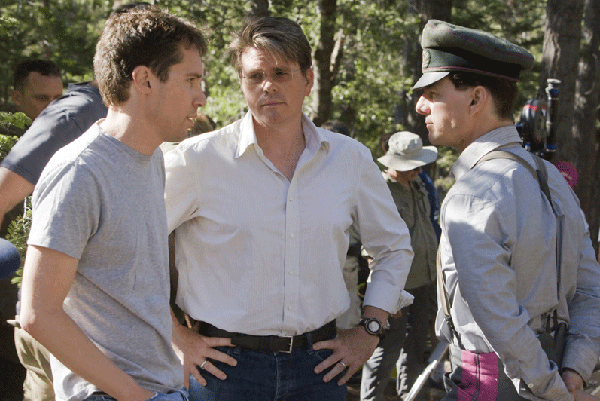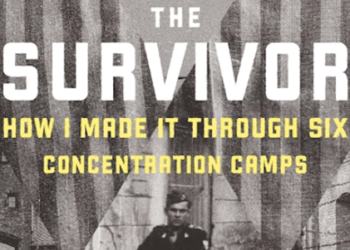By CURT SCHLEIER /Â Special to the AJW
For a director, every film is special, a baby that needs to be nurtured. But for filmmaker Bryan Singer, making “Valkyrie” was “different.” He spent months in Berlin filming this story about a plot to assassinate Hitler during the waning days of the war. In that time, he experienced sentiments he still finds difficult to verbalize.
“It was different in the sense that my cinematographer, Newton Thomas Sigel, and I were the only Jews,” Singer said in a telephone interview. “Being Jews in that environment, living in  Berlin, making this type of movie did have a different effect on me than it did on the rest of the cast and crew. But I couldn’t tell you what it is. Knowing a little bit of Holocaust history, it can be a little…”
He pauses looking for the right word.
“It’s just different,” he says finally. “Tom and I would look at each other and talk. He had the same feeling and we decided it has to do with being Jewish. You can’t help it.
“Berlin is a city steeped in history. The ghosts of the Second World War are everywhere. The apartment where I stayed overlooked the plaza where the books were burned. I would go to the local Starbucks for a little bit of America and it was right next to the Brandenburg Gate and the Reichstag.”
Valkyrie, which opened Dec. 25, is a combination of Mission Impossible (for its consistently high level of intensity) and a PBS special (for its historical accuracy).
Changes to the record involved reducing the number of plot participants – down to a few dozen from the 2,000 or so who were connected to it. Most of them were primarily concerned about the future of Germany and its military. But many, like Col. Claus von Stauffenberg (played by Tom Cruise), saw it as their duty “no longer to save my country, but to save human lives.”
That was from von Stauffenberg’s diary, in which he also expressed his “disgust” at “the murder of civilians, the torture and starvation of prisoners, the mass execution of Jews.”
This is not the first time Nazis appeared in one of Singer’s films. They showed up in his “X-Men” films, and of course in his adaptation of the dark Stephen King novella, “Apt Pupil.”
“I loved the book. I read it when I was 17. I was always fascinated with the history of the Nazis and the Nazi iconographies – as well as the sheer, overwhelming horror of it. And I felt this movie was about a kid who shared this fascination and took it to a very dark place.”
Singer was adopted shortly after birth by a largely secular Jewish family and raised in New Jersey.
“My immediate family was not particularly religious; my extended family was more so. We went to Temple on the holidays, but I was not Bar Mitzvahed. A lot of my Jewish friends are surprised by that and I have an uncle who is 87 and keeps wanting me to do it.”
He became aware of the atrocities when he was very young. His family “spoke about (the Holocaust) quite often,” he said.
“My mother’s side of the family was from Russia and my father’s side was Polish,” Singer said. “A lot of their family was wiped out. In our family, there was an album, a series of portraits of relatives, many of whom I recognized. But there was a section of people [where] I have no idea who they were. I asked my father who these people are. He just said ‘these people are gone. They’re the people who are gone.’ It was a visual representation of how my relatives were wiped out.”
Talking about the album brings to mind another anecdote.
“Two of my best friends growing up were German, and we used to talk about Germany and the Holocaust,” Singer said. “We also used to play war and sometimes I’d be the American soldier and sometimes I’d be the German. When my mother found out about that she gave me a pretty stern lecture about what six million meant and how it extended to our family.”
But it was a high school social studies teacher, a Ms. Fiscarelli, who taught a unit on the Holocaust and really interested him in the subject. His other hobby was photography and film. He attended film school, broke through with The Usual Suspects, and has been given increasingly important – and expensive – projects ever since. In fact, there are reports that the fate of the studio, United Artists, hinges on the movie’s success.
Singer laughs when that is mentioned. “I don’t think about that,” he says. But certainly he’s heard the stories. “I still don’t think about that. I don’t pretend to know on whose shoulders the studio’s future rests.”
Whether he thinks about it or not, it has affected the perception of the film. Cruise heads United Artists, which has gone through an executive reshuffling and badly needs a hit. In addition, there are the problems associated with being anywhere near Tom Cruise at a time when the media (and anyone with an Internet blog) seems to relish piling on.
 “The deal I made with United Artists was unrelated to (Cruise) being in the picture. But in the back of my mind I was keenly aware of his physical resemblance to von Stauffenberg. Also, I knew that besides his stardom he’d done some unconventional roles and I was hoping he would do it.”
Cruise, familiar with the project as a UA executive, signed on. For Singer, who has never directed a major film star, this added a new dimension to the project.
“I was aware (of the noise surrounding Cruise), but I didn’t obsess over it,” Singer said. “I don’t surf the Internet gossip sites. I don’t read tabloids. I know Tom’s career and I know the films he’s made and the filmmakers he’s worked with. I know him to be hardworking and sincere.”
Problems began early, when the German Defense Ministry threatened to refuse Singer access to its building and sites if Cruise, a Scientologist, was cast in the role of von Stauffenberg. Germany has a long history of run-ins with Scientology.
Singer maintains that once he explained the seriousness with which he and Cruise approached the film, the government relented and even helped finance the picture. That wasn’t enough for the kick-’em-when-they’re down experts, who went into a feeding frenzy. They didn’t like the early posters of Cruise in an eye patch. They didn’t like that he didn’t speak with a German accent (at Singer’s direction). One online poster didn’t even like the way he gave the Nazi salute.
Yet his performance is more than credible and the film more than suspenseful. Moreover, for many viewers it will be a revelation. The plot was more than just a briefcase bomb, but there were plans for a widespread coup to take over the reins of power.
 “The events here were extraordinary,” Singer said. “I didn’t want to make a languid biopic.”
And, despite the sniping, Singer succeeded.
Â





















